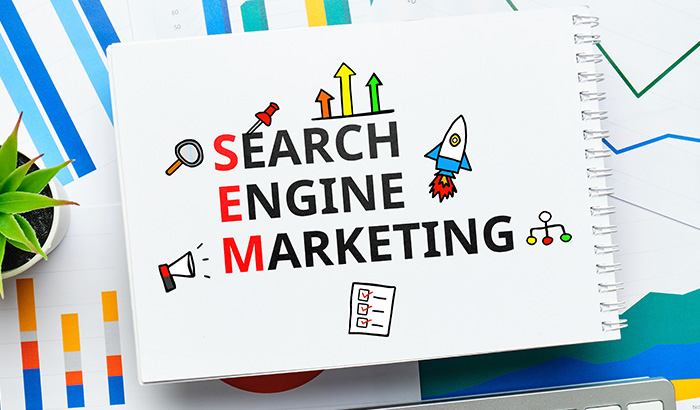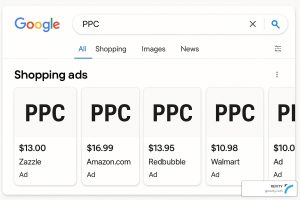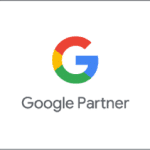Welcome to the ever-evolving world of digital marketing! You’re not alone if you’re navigating the vast ocean of online strategies. Every business, from budding startups to established enterprises, grapples with determining the best approach to connect with their audience online.
With social media campaigns, influencer partnerships, email marketing, and many other channels to consider, it’s easy to feel overwhelmed. But one strategy consistently rises to the top in terms of impact and ROI: Search Engine Marketing or SEM.
So, what exactly is SEM?
At its core, Search Engine Marketing is a powerful method that promotes websites by increasing their visibility in search engine results pages, primarily through paid advertising. It’s a direct gateway to place your products, services, or content right in front of the eyes of potential customers who are actively searching for what you have to offer.
As we delve deeper into the nuances of SEM and its significance, remember that every successful digital strategy is rooted in understanding your audience and meeting them where they are. Considering that billions of searches get made daily, it’s clear that many of your potential customers are waiting to be reached through search engines.
Stick with us as we uncover the reasons why SEM should be an integral part of your digital toolkit and how it can be the bridge that connects your business to your audience in meaningful ways. Whether you’re new to the concept or simply need a refresher, we’re here to guide you every step of the way.
Understanding More About SEM
Search Engine Marketing primarily revolves around harnessing the power of search engines to boost the visibility of your website. How? Predominantly through paid efforts. When someone types a query into a search engine, they’re met with a blend of paid advertisements and organic results.
The advertisements, often appearing at the top or side of the page, are a direct result of SEM strategies. These are called paid search ads. Platforms like Google Ads allow businesses to place their offerings right where users are actively searching, making it an invaluable tool for capturing potential leads.
You might think, “Wait, I’ve heard of SEO too. How does that fit in?” Good catch! While SEM primarily refers to paid search advertising, in some contexts, it also embraces Search Engine Optimization (SEO).
SEO is the art and science of optimizing your website and content to naturally rank higher in search engine results without directly paying for placement. Think of it as the organic counterpart to the paid aspect of SEM.

SEM vs. SEO: Spotting the Differences
Understanding the nuances between SEM and SEO is paramount, even if they occasionally intertwine. Let’s start by delving into the nature of the traffic they attract.
Both SEM and SEO strive to amplify visibility on search engines. However, SEM predominantly utilizes paid avenues to secure traffic. When you invest in SEM, you’re essentially purchasing prime ad space. Conversely, SEO employs organic means, where your website earns its position in search results through credibility and relevance.
The timeline to witness tangible results also varies between the two. Platforms like Google Ads, under the SEM umbrella, have the potential to yield instantaneous outcomes. You’re immediately on the radar once your ad campaign springs to life and is fine-tuned.
SEO, in comparison, is akin to a marathon. It demands perseverance, an unwavering commitment, and top-tier content to gradually ascend in search engine standings.
Shifting our gaze to the financial aspects, SEM incurs a direct expense for each click or impression your advertisement garners. SEO operates differently in this regard. While there’s no direct charge associated with clicks or impressions, expenses might arise from endeavors like crafting stellar content, optimizing your website, or other ancillary activities.
Lastly, when pondering the degree of control and adaptability, SEM takes the lead regarding immediate adjustments. Modifications can be instated in real-time if an advertisement falters to enhance performance.
SEO presents a more intricate dance. Search engine algorithm modifications, burgeoning competition, and a plethora of other elements can sway organic rankings. Tweaks in the SEO strategy don’t always yield immediate shifts.
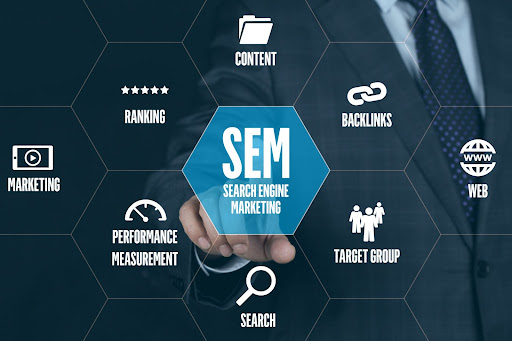
Why SEM is Essential for Digital Marketing
Navigating the digital realm can be akin to exploring a vast forest. With so many paths to take, it’s vital to have a compass guiding you to the most fruitful destinations. In the world of online marketing, SEM is that compass.
Here are eight reasons SEM stands out as an indispensable tool in your digital marketing arsenal.
1. Instant Visibility
In the online world, time is of the essence. While the diligent work of SEO molds a website to rise in rankings organically, it’s a gradual ascent. SEM, on the other hand, propels your website to the forefront, granting immediate visibility. It’s akin to having a VIP pass at a concert — you get to skip the line!
The value of securing a spot at the top of search results can’t be overstated. As searchers, we’re naturally inclined to click on the first few results. By positioning yourself prominently, SEM ensures your brand gets the attention it deserves right off the bat.
2. Targeted Advertising
One of SEM’s most significant assets is its ability to zoom in on your target audience with surgical precision. Want to reach 30-something coffee enthusiasts in Seattle? Or tech-savvy retirees in Florida? SEM has you covered. This meticulous targeting translates to ads that resonate deeply, fostering higher conversion rates.
With the power to choose demographics, behaviors, and even the time of day your ad is displayed, you tailor every aspect of your campaign. It ensures your message reaches the right eyes at the right moment.
3. Controllable Budget
Venturing into paid advertising might sound daunting, but SEM provides a safety net. With the capability to set a clear budget and decide how much you’re willing to bid for ads, you’re in the driver’s seat, ensuring that campaigns align with your financial comfort zone.
The beauty of SEM lies not only in setting a budget but in its adaptability. Witnessing a commendable ROI? You can amplify your spending. On the contrary, if a campaign doesn’t yield the expected results, scaling down is just as simple.
4. Measurable Results
In life and digital marketing, knowledge is power. SEM offers comprehensive analytics, painting a clear picture of your campaign’s performance. From click-through rates to conversion metrics, every detail is at your fingertips.
These insights aren’t merely for admiration. They’re actionable. By continuously monitoring metrics, you can tweak your strategies in real-time, ensuring your campaigns are always optimized for maximum impact.
5. Competitive Advantage
In the digital arena, competition is fierce. SEM offers a strategic edge, allowing businesses the chance to outbid competitors, ensuring that your brand gets the spotlight.
For industries where online rivalry is intense, SEM isn’t only a recommendation; it’s essential. It’s the difference between blending in and standing out.
6. Enhancing Brand Awareness
Here’s a comforting thought — even if a user scrolls past your ad without clicking, your brand still makes an impression. This consistent visibility over time etches your brand into users’ minds.
The more users see your brand, the more familiar it becomes, and in the digital world, familiarity breeds trust. Consistent visibility through SEM amplifies brand credibility.
7. Complements Organic Efforts
We explained the differences, but you can also think of SEM and SEO as two sides of the same coin. While SEM provides an immediate boost, SEO lays the foundation for sustained visibility. Together, they ensure your brand remains a top contender in both paid and organic listings.
No matter how optimized, there might be keywords where organic rankings fall short. SEM can bridge this gap, ensuring you’re visible for those high-value search terms.
8. Quick Testing of Marketing Messages
Wondering if a new headline will resonate? Or if a fresh design will captivate more users? SEM campaigns provide a sandbox for experimentation. Through A/B testing, different versions of ad copies, landing pages, or offers are compared in real time.
The results of these tests come rapidly, allowing marketers to refine their strategies on the fly. This dynamism ensures that your marketing messages are always in their prime form.
In this digital age, where the landscape is vast and ever-evolving, it’s paramount to harness tools that not only amplify visibility but also resonate authentically with the target audience.
SEM isn’t simply another tool in the shed; it’s a powerhouse that brings agility, precision, and adaptability to the forefront of online marketing endeavors. Its multifaceted benefits, from laser-focused targeting to real-time adaptability, provide businesses with a unique synergy to connect, captivate, and convert.
As you chart your course through the intricate maze of digital marketing, let SEM be the guiding light that illuminates the path to sustained success and impactful connections. Harness its potential, and watch your brand narrative unfold in the most compelling ways.
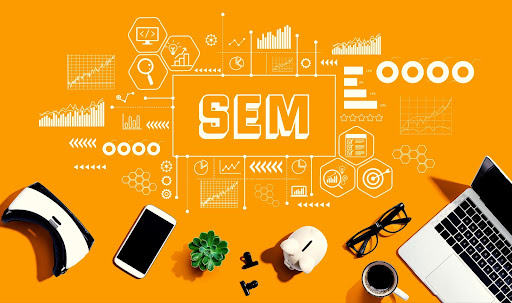
Best Practices for a Successful SEM Campaign
Navigating the world of Search Engine Marketing might initially seem complex, but with the right map in hand, the journey becomes an exhilarating exploration. Let’s walk the path of discovery and delve into the best practices that will elevate your SEM campaigns to new heights.
Keyword Research: The Pulse of Search Intent
Imagine tapping into your potential customers’ collective consciousness, knowing exactly what they’re seeking. That’s the magic of keyword research. It’s about understanding and anticipating what terms or phrases your audience uses to search for products or services like yours.
While popular, broad terms might have high search volumes, it’s often the more specific, long-tail keywords that bring in genuinely interested visitors. Tools like Google’s Keyword Planner or SEMrush will help unveil these golden nuggets, ensuring your ads appear for the most relevant and conversion-friendly searches.
Ad Copy Optimization: Crafting Magnetic Messages
Think of your ad copy as the handshake or greeting that introduces your brand to potential customers. A well-crafted ad is informative while also compelling, nudging searchers to explore further.
Dive into the emotions and needs of your target audience. Address their pain points, highlight unique selling propositions, and end with a clear call to action. Remember, your goal is to make them feel like your ad was written specifically for them.
Landing Page Relevance: Bridging Expectations
When a user clicks on your ad, they arrive with a set of expectations. Your landing page should seamlessly deliver on the promise your ad made. If your ad speaks about a specific product, offer, or feature, the landing page should prominently highlight that very element.
A well-designed landing page is visually appealing, but it’s the relevance and clarity of its content that truly matters. Ensure that the user journey from the ad clicks to conversion on the landing page is intuitive, straightforward, and devoid of distractions.
Regular Monitoring and Adjustments: The Dance of Dynamism
An SEM campaign isn’t a “set it and forget it” endeavor. It’s a living entity that thrives on regular attention. By consistently monitoring performance metrics, you glean insights into what’s working and areas ripe for improvement.
As market conditions, user behavior, and competition dynamics evolve, your SEM strategy should, too. Whether it’s adjusting bids, refining keywords, or tweaking ad copy based on feedback, a proactive approach ensures your campaign remains in its prime form.
Remember, every campaign, every ad, every keyword is a learning opportunity. As you gather insights and refine your strategies, you’ll find that SEM, with its vast potential, becomes less of a mystery and more of a trusted ally in your digital marketing endeavors.
Common Misconceptions About SEM
Search Engine Marketing, despite its proven efficacy, isn’t immune to some myths and misinformation. Here are five common misconceptions about Search Engine Marketing (SEM) and a brief explanation of each:
“SEM is only about paid ads.”
While a significant portion of SEM is indeed about paid advertising (like PPC campaigns), it often also encompasses other techniques and strategies, including optimizing ad copy, landing page testing, and even sometimes elements of SEO.
“SEM is too expensive for small businesses.”
SEM adaptable to fit almost any budget. While big companies might spend more, small businesses can also benefit from SEM by focusing on niche keywords, setting clear budget caps, and regularly monitoring their campaigns for optimization.
“If you’re doing SEO, you don’t need SEM.”
While both SEM and SEO aim to increase visibility on search engines, they work best in tandem. SEM delivers immediate results and targets specific audiences or products, while SEO builds long-term organic visibility.
“Once you set it up, SEM runs itself.”
SEM requires consistent monitoring and optimization. Ad performance may change based on competition, seasonality, market trends, and other factors. Regularly checking and adjusting your campaigns ensures they remain effective.
“Higher bids guarantee better ad placement.”
While bidding is a crucial component of ad placement, search engines also consider the quality and relevance of ads and landing pages. It’s possible for a well-optimized ad with a lower bid to rank higher than a less relevant ad with a higher bid.
Dispelling these myths surrounding SEM is not only about correcting misinformation but it’s also about empowering businesses to navigate the digital realm confidently and effectively.
By understanding the true essence and capabilities of SEM, businesses craft strategies that are both informed and adaptable. This knowledge-rich approach guarantees that they not only avoid common pitfalls but also harness the full potential of SEM.
With clarity on what SEM truly offers, businesses will optimize their resources, fine-tune their campaigns, and thereby enhance their digital presence, ensuring they thrive in an increasingly competitive online marketplace.
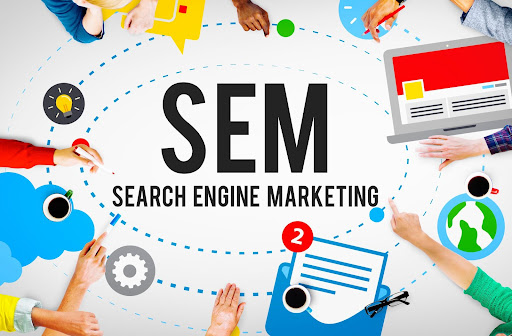
Expand Your Digital Presence With Revity
Recognizing the importance of SEM in digital marketing is only the first step in a journey that requires expertise, continual optimization, and a deep understanding of market dynamics. This is where partnering with seasoned experts like Revity will change the game for your business.
Revity works to demystify the complexities of SEM for businesses big and small. Our seasoned professionals don’t only offer solutions; we build partnerships to foster your business’s growth. With custom strategies that resonate with your brand ethos, budget, and business objectives, we lay the groundwork for your digital success.
Our approach transcends the routine with meticulous keyword research. Next, we delve into the very core of what your potential customers are seeking. This strategic foresight guides the crafting of ad copies that stand out and speak directly to your audience’s needs and aspirations.
But our role in your digital narrative doesn’t end there. We believe in providing continuous quality and innovation by monitoring, tweaking, and optimizing your campaigns. We are committed to ensuring that your SEM initiatives are dynamic, evolving with market trends, consumer behavior, and competitive landscapes.
Revity’s expertise isn’t confined to SEM. We’re equipped to be your allies in comprehensive digital marketing, providing integrated solutions across platforms, from social media to email campaigns, fortified with robust SEO strategies.
This all-encompassing approach ensures a cohesive and consistent brand narrative, alleviating the pressure on you to juggle multiple marketing efforts and allowing you to focus on your operational priorities.
Contact Revity or call 801-877-3362, and let’s embark on a transformative journey. Embrace the opportunity to propel your traffic, amplify your leads, and skyrocket your growth.

